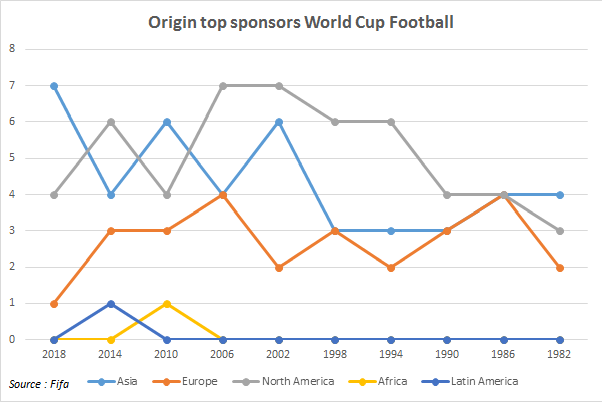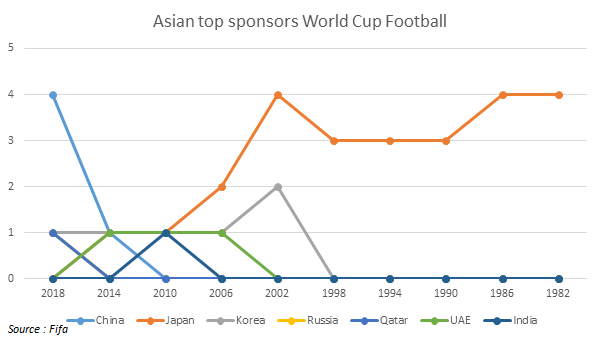Although the FIFA World Cup 2018 is mainly about the European and Latin American countries that dominate the top ten of the FIFA rankings, Asia is dominating in a playing field that is directly related to the World Cup, but is not quite in the spotlight, especially China.
China is a country that is not well known for its football team. Nevertheless, the country, which is led by the communist party, invests large amounts of funds on a yearly basis to further develop football in the country. Xi Jinping is a big fan of football and can only wish that China will dominate international soccer one day. China is currently in 75th place on the FIFA rankings, while it has 1.4 billion inhabitants. Xi Jinping has outlined a goal that China will qualify for the next World Cup.
Moreover, it wants to organise the World Cup in the coming decades, potentially 2030 or 2034, as Canada, Mexico and the United States claimed the spot for 2026, and states that China wants to be the world champion by 2050. The almighty leader came up with a master plan where China wants to have 20,000 football training centres and 70,000 football fields by 2020. Ambitious goals for now and China has still a long path to go before it will possibly reach its goal. At the moment of writing, there is another area, related to football, where China already dominates the football industry, namely tournament sponsoring.
Chinese Sponsorships
China is the dominant player in sponsoring the 2018 World Cup. China is the major sponsor in terms of income for the football tournament in Russia. When watching the football matches that are frequently broadcast worldwide, it can be seen that names, like Wanda (Chinese real estate and entertainment conglomerate) dominates the sponsor boards around the football field. It seems Wanda is spending funds in the purely for a reputational reason. The conglomerate wants to show the outside world that business is going in a positive direction and that promising returns on the investments are on the way. In the firms’ view, the World Cup is the perfect way to reach a large (Western) audience. Moreover, other names like Hisense, Vivo and Mengniu are visible on the hoardings as well. All those brands have one similarity, namely that they want to spread their brand around the globe and show the outside world that they are a leading brand.
The total income for FIFA for this World Cup is eye wateringly high. From the period between 2011-2014, from the first qualification match until the end tournament of 2014, $1.6bn was earned through sponsorship deals. Chinese investors filled the sponsor gap that occurred when companies as Johnson & Johnson and Sony terminated their own deals, since these companies did not want to be related with the corruption affair linked to the FIFA back in 2014. Still, it can be seen that overall sponsor income is 9.38% lower compared to 2014. This is mainly related to the aforementioned corruption affair.
According to Nielsen, Asia, mainly China, has a 39% stake in terms of sponsorship agreements related to the World Cup. It is estimated that Chinese firms have agreed deals totalling around $855m with FIFA. This is indeed more than a third of all sponsor and advertisements income for Russia. Moreover, the World Cup 2018 has a reach of more than 3 billion people. Consequently, it can be stated that the World Cup football is among the most watched events in the world. Chinese companies mainly make use of this to further spread their brand name with rapid growth as the underlying final goal, increasing the value of Chinese brands and prices of products.
Additionally, Xi Jinping wants to make football more prominent in the country itself and by heavily promoting football nationally and internationally, more Chinese people will play football which will bring China one step closer to qualifying for the next World Cup. This year 40,000 tickets were sold to Chinese people while 4 years ago this number was only 7,400 tickets. It seems Xi’s master plan is working.
Philippe Le Floc’h, FIFA’s Chief Commercial Officer, says:
“Its companies were initially focusing on the domestic market. But now they understand or they have come to the point where they control the domestic market and they want to go abroad. And there was a bit of a natural fit with the biggest sport on Earth. The property has a global foot print. And it was easy for them to go abroad using the most famous sport on Earth.”
The above quote from Le Floc’h says it all, Chinese companies are dominating World Cup sponsorship deals and want to rapidly increase brand awareness around the globe. Step by step the dragon is conquering the world in terms of brand expansion. This is also visible from the graphs presented below:
It can be seen that Asia, and particularly China, has been taking a dominant position in terms of sponsorship regarding World Cup football over the last decade. While China had zero influence in 2010, the dragon tremendously increased its sponsorship position over the last eight years. On the contrary, all other continents and countries remained constant or even decreased in terms of sponsorship position over the same time period. As mentioned before, corruption is the crucial reason behind this.
Conclusion
In short, China has no chance of winning the World Cup in Russia, as they did not qualify. Nevertheless, China is dominating the World Cup on the sideline of each and every single Russian football stadium, making China the most crucial player in terms of sponsorships.
Xi Jinping has major plans in terms of football development. The organisation of the World Cup in 2030 or 2034, the qualification for the next World Cup in Qatar and the process of becoming the world champion by 2050 are all Xi’s ambitious targets for the upcoming years. If Xi is as successful with ‘real’ football as he is with expanding its domestic brands by means of sponsorship deals, China has a considerable chance of obtaining the world champion title by 2050. It will be quite wise to follow China during the upcoming years when it comes to football and further sponsorship agreements, especially for European and Latin American countries, as China will probably be more and more dominate in the beautiful game.
*This article was previously published at De Geldpers (www.degeldpers.nl)*



















